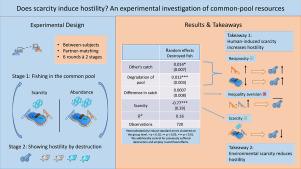Does scarcity induce hostility? An experimental investigation of common-pool resources
IF 6.6
2区 经济学
Q1 ECOLOGY
引用次数: 0
Abstract
Climate change is leading to an increased scarcity of resources such as freshwater, energy, arable land and wildlife. This is perceived as a major security threat. However, the literature remains unclear on whether scarcity mitigates or exacerbates conflict. We design a novel laboratory experiment to investigate hostile behavior under scarcity. Participants interact repeatedly in a dynamic common-pool resource (CPR) and a joy-of-destruction game. The experiment distinguishes between two types of scarcity: Endogenous scarcity in the form of a deliberate human choice to overexploit resources and exogenous scarcity in the form of adverse environmental conditions. Our results show that endogenous scarcity exacerbates hostility. We trace this to participants being guided by negative reciprocity while finding no support for inequality aversion. The results indicate that to avoid hostility, policy makers will have to reduce human-induced scarcity. However, our results also show that exogenous scarcity mitigates hostility. This is in line with a vast body of literature from psychology, anthropology and biology finding increased levels of cooperation for all forms of life under environmental distress. It suggests that managing perceptions around increasing scarcities could be a second potential avenue for policy action.

稀缺会诱发敌意吗?对共有资源的实验研究
气候变化导致淡水、能源、耕地和野生动物等资源日益稀缺。这被视为一个重大的安全威胁。然而,关于资源稀缺是会缓解还是会加剧冲突的文献仍不明确。我们设计了一个新颖的实验室实验来研究稀缺条件下的敌对行为。参与者在动态公共资源(CPR)和破坏乐趣游戏中反复互动。实验区分了两种稀缺性:一种是人类故意选择过度开发资源的内生稀缺性,另一种是不利环境条件下的外生稀缺性。我们的研究结果表明,内源性稀缺会加剧敌意。我们将其归因于参与者受到负互惠的引导,而不支持不平等厌恶。结果表明,为了避免敌意,决策者必须减少人为造成的稀缺性。然而,我们的结果也表明,外生稀缺性会减轻敌意。这与心理学、人类学和生物学的大量文献相吻合,这些文献发现,在环境困境下,所有生命形式的合作程度都会提高。这表明,管理与日益稀缺有关的观念可能是政策行动的第二个潜在途径。
本文章由计算机程序翻译,如有差异,请以英文原文为准。
求助全文
约1分钟内获得全文
求助全文
来源期刊

Ecological Economics
环境科学-环境科学
CiteScore
12.00
自引率
5.70%
发文量
313
审稿时长
6 months
期刊介绍:
Ecological Economics is concerned with extending and integrating the understanding of the interfaces and interplay between "nature''s household" (ecosystems) and "humanity''s household" (the economy). Ecological economics is an interdisciplinary field defined by a set of concrete problems or challenges related to governing economic activity in a way that promotes human well-being, sustainability, and justice. The journal thus emphasizes critical work that draws on and integrates elements of ecological science, economics, and the analysis of values, behaviors, cultural practices, institutional structures, and societal dynamics. The journal is transdisciplinary in spirit and methodologically open, drawing on the insights offered by a variety of intellectual traditions, and appealing to a diverse readership.
Specific research areas covered include: valuation of natural resources, sustainable agriculture and development, ecologically integrated technology, integrated ecologic-economic modelling at scales from local to regional to global, implications of thermodynamics for economics and ecology, renewable resource management and conservation, critical assessments of the basic assumptions underlying current economic and ecological paradigms and the implications of alternative assumptions, economic and ecological consequences of genetically engineered organisms, and gene pool inventory and management, alternative principles for valuing natural wealth, integrating natural resources and environmental services into national income and wealth accounts, methods of implementing efficient environmental policies, case studies of economic-ecologic conflict or harmony, etc. New issues in this area are rapidly emerging and will find a ready forum in Ecological Economics.
 求助内容:
求助内容: 应助结果提醒方式:
应助结果提醒方式:


